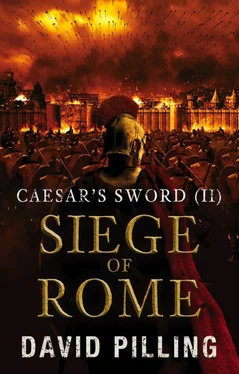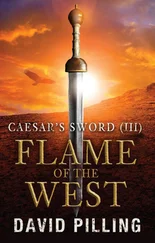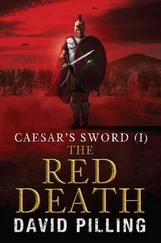David Pilling - Siege of Rome
Здесь есть возможность читать онлайн «David Pilling - Siege of Rome» весь текст электронной книги совершенно бесплатно (целиком полную версию без сокращений). В некоторых случаях можно слушать аудио, скачать через торрент в формате fb2 и присутствует краткое содержание. Год выпуска: 2013, Жанр: Исторические приключения, на английском языке. Описание произведения, (предисловие) а так же отзывы посетителей доступны на портале библиотеки ЛибКат.
- Название:Siege of Rome
- Автор:
- Жанр:
- Год:2013
- ISBN:нет данных
- Рейтинг книги:3 / 5. Голосов: 1
-
Избранное:Добавить в избранное
- Отзывы:
-
Ваша оценка:
- 60
- 1
- 2
- 3
- 4
- 5
Siege of Rome: краткое содержание, описание и аннотация
Предлагаем к чтению аннотацию, описание, краткое содержание или предисловие (зависит от того, что написал сам автор книги «Siege of Rome»). Если вы не нашли необходимую информацию о книге — напишите в комментариях, мы постараемся отыскать её.
Siege of Rome — читать онлайн бесплатно полную книгу (весь текст) целиком
Ниже представлен текст книги, разбитый по страницам. Система сохранения места последней прочитанной страницы, позволяет с удобством читать онлайн бесплатно книгу «Siege of Rome», без необходимости каждый раз заново искать на чём Вы остановились. Поставьте закладку, и сможете в любой момент перейти на страницу, на которой закончили чтение.
Интервал:
Закладка:
A few more hours, then, and I would be safe. “What if Theodora and Narses send agents after me? No-one would notice a few men disguised as soldiers.”
“Perhaps. Theodora, at least, has no need for such crude stratagems. Her greatest agent will be among us, in plain view.”
It took me a moment to fathom his meaning. “Yes,” he said, reacting to the horror on my face, “Antonina is coming with us.”
4.
The fleet put to sea the next morning, propelled down the straits of the Bosphorus by a fair wind and the cheers of the multitude gathered on the docks. Their cheers were mingled with the dirge-like chants of the priests, clashing cymbals, screeching trumpets, and the tolling of every church bell in the city.
Before the African expedition, the Emperor and the Patriarch came to the harbour in person to give the fleet their blessing. They did so again now, though the Patriarch was so old he had to be carried in a litter. I heard the roar of the crowd treble in volume as Justinian arrived, preceded by the droning of bull-horns and escorted by six hundred of his personal guard, the Excubitors.
Heard, but did not see. I was confined below deck with two Huns to protect me and ensure I stayed hidden. They were a couple of surly, yellow-skinned brutes, typical of their race, and dripping with weaponry.
“No need to watch me so closely, boys,” I said with feigned cheerfulness, “I’m quite happy where I am.”
At last the moment I dreaded arrived. The ship began to move. I crouched in a corner, draping my cloak over me as a blanket and preparing for the worst.
The histories will tell you that the Roman fleet encountered no difficulty on the short voyage from Constantinople to Sicily. No storms delayed our progress, the winds were constant, and the Sicilian coast completely undefended. The Emperor’s ruse had worked. The Gothic fleet, such as it was, had sailed north carrying troops and supplies to reinforce their garrisons in Dalmatia.
To me, trapped below deck in the grip of sea-sickness, the voyage was a miserable and painful ordeal. The Huns kindly provided me with a bucket, which they emptied at regular intervals. Procopius visited me once or twice, to give me updates and check that I hadn’t puked myself to death.
“You are a better sailor than you claimed,” I whispered during one of his visits.
Procopius smiled weakly. He was even paler than usual, and trembled slightly, but his illness was nothing compared to mine. I could not walk, or eat, and shivered uncontrollably like a sick dog.
“Courage,” he replied, “we will soon be on dry land, and there will an end to this damned creaking and lurching. Belisarius means to land at Catania.”
This made sense. Catania was a desolate, rocky stretch of dried lava, near the base of Mount Etna. He had landed there before on the way to North Africa.
“What then?” I asked, drawing my blanket closer around me. My guts gave a sudden heave, and Procopius’ answer was delayed while I retched feebly into the bucket.
“We march on Palermo,” he said when I was done, “once the principal city falls, the rest of Sicily will follow. An easy conquest.”
Too easy, was my initial thought. Even a dotard like Theodatus would surely not have left the island undefended. My suspicious mind spun all kinds of alternatives. Perhaps the Goths were waiting in force at Palermo, to attack our much smaller army as we marched inland. Perhaps their fleet was hidden, somewhere among Sicily’s northern coastline, and would emerge to fall upon ours at Catania.
“What of Antonina?” I asked, dragging my mind away from these dreadful scenarios, “does she I know I am aboard?”
“Oh yes. I was with Belisarius when he mentioned your presence to her, two days ago. Our tame Briton, he called you.”
I swallowed hard, and rested my head against the hull. “How did she react?”
Procopius shrugged. “She didn’t. As far as her husband is aware, you mean nothing to her. She must have known you were aboard anyway.”
He squatted down on his haunches. “Attend to me, Coel,” he said severely, “for your life is most certainly in danger. Antonina has brought her son, Photius, the fruit of one of her previous marriages.”
I blinked at him. The name was vaguely familiar to me, but I had never seen Photius, and knew nothing of him.
“He is very young, barely grown to manhood,” Procopius added, “and has inherited his mother’s courage and fair looks. There, unless he is a better actor than I judge him to be, the resemblance ends. There is no deceit in him. Rather, he is impulsive, and constantly at Belisarius’ elbow, begging him for a command. Eager to win glory at the point of a sword.”
“Is he a threat to me?” I asked, who cared nothing for Photius or his ambitions.
“Possibly. He adores his mother, though she appears to care nothing for him. There is little he would not do to win her approval.”
“Including murder?”
“I don’t know. Perhaps. Antonina would not hesitate to use him as a weapon against you. The question is whether he would agree to it.”
Procopius thought for a moment, tapping his finger-tips together. “I think,” he said eventually, “that Belisarius should give this valiant young man a chance to prove himself.”
His eyes bored into mine. “Yes. Photius should be among the first to be sent ashore. Perhaps he can be dispatched on a scouting mission inland, with just a few men for company. Picked men.”
I knew what Procopius was implying. It filled me with revulsion, but I was too old and battle-hardened to be entirely scrupulous.
“You would go to such lengths, for me?” I asked quietly, “why?”
“Belisarius values you, as an officer and a friend,” he replied, rising, “he asked me to see you safe. He commands, and I obey. Not that I have any objection to seeing Antonina thwarted. She hates me, as she hates anyone with influence over her husband. She wants Belisarius all to herself.”
“Does she love him?”
Procopius gave a dry chuckle, the nearest he ever got to laughter. “Like an epicure loves his dinner. Antonina will eat him alive and then toss away the bones.”
I remained below deck until the fleet made landfall at Catania, which lies on the east coast of Sicily, facing the Ionian Sea. Despite the harsh and rugged landscape, there was a city here, much reduced from its former wealth and status after being sacked by the Vandals. The garrison offered no resistance, and opened the city gates to our soldiers after Belisarius promised not to sack the town or molest the inhabitants.
I was sick of concealment, and of languishing in my own stench in the stuffy hold. The Huns were sick of me too, and watched impassively as I crawled feebly up the ladder onto deck.
The sunlight was dazzling, and I had to shade my eyes until they grew used to the unaccustomed glare. I tried to stand on the deck as it gently rose and fell beneath me, but my shaking legs gave way.
A strong hand gripped my forearm as I fell, and hauled me upright. “Steady, old man,” said a familiar voice, “we shall have to find you a stick to lean on.”
I opened my eyes a crack and gazed on the rugged, dark-skinned features of Bessas, one of Belisarius’ chief cavalry officers. He was a Thracian of Gothic origin, fluent in the Gothic language, and I had often overheard him croaking songs in that harsh, guttural language.
Belisarius was a good judge of officers, and could scarcely have chosen a better man to lead his cavalry in Italy. Not only did Bessas speak the language of the enemy, but he was a tough, resourceful veteran of many campaigns, in his mid-fifties or thereabouts, and strong as a bull. His fingers had a grip like steel on my wasted arm. If he had increased the pressure, he might have snapped the bone.
Читать дальшеИнтервал:
Закладка:
Похожие книги на «Siege of Rome»
Представляем Вашему вниманию похожие книги на «Siege of Rome» списком для выбора. Мы отобрали схожую по названию и смыслу литературу в надежде предоставить читателям больше вариантов отыскать новые, интересные, ещё непрочитанные произведения.
Обсуждение, отзывы о книге «Siege of Rome» и просто собственные мнения читателей. Оставьте ваши комментарии, напишите, что Вы думаете о произведении, его смысле или главных героях. Укажите что конкретно понравилось, а что нет, и почему Вы так считаете.












